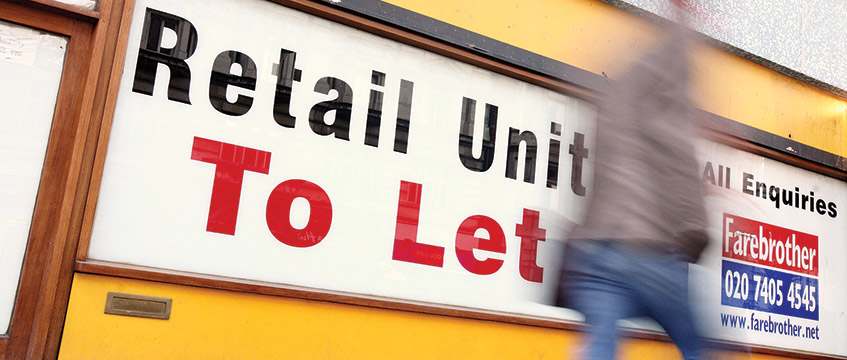Don’t let a lease become a liability
The balance of power has shifted towards tenants in recent years, and this means it is essential for landlords to be prepared to work with occupiers – and to be ready to enforce their rights if necessary, writes Vijay Parikh.
With growing numbers of retail tenants struggling financially in the face of increased rates and lower demand for goods and services – coupled with competition from online sellers – the high street is changing. This year has seen a record number of company voluntary arrangements (CVAs) and insolvencies.
Lease length and tenant covenant have long been the benchmark for quality commercial investments, but in the current climate neither of these elements can be taken for granted.
The balance of power has shifted towards tenants in recent years, and this means it is essential for landlords to be prepared to work with occupiers – and to be ready to enforce their rights if necessary, writes Vijay Parikh.
With growing numbers of retail tenants struggling financially in the face of increased rates and lower demand for goods and services – coupled with competition from online sellers – the high street is changing. This year has seen a record number of company voluntary arrangements (CVAs) and insolvencies.
Lease length and tenant covenant have long been the benchmark for quality commercial investments, but in the current climate neither of these elements can be taken for granted.
So how should investors respond?
Lease length
The days of 25- or 30-year leases ended in the late 1990s. In the late 2000s, during the time of Barclays’ sale-and-leasebacks, leases were generally granted on 15-year terms with a tenant break at year 10. In recent renewals of leases, the norm is now a five-year lease, or 10 years with a tenant option to determine at year five. Even when leases are granted upon renewal, tenants have managed to negotiate a rent-free period. The balance of power between the landlord and tenant has undoubtedly shifted in favour of the tenant. Aside from retailer confidence being at a low, landlords now face a risk of unlet properties and empty rates. An investment can easily turn into a liability.
Tenant arrears
It goes without saying that if a tenant is in arrears of rent, there could be a problem. Here are the key points to consider first:
Check the lease: when is rent due and is interest payable – and when?
Stay on top of the arrears. If the arrears build up, they become more and more difficult for the tenant to clear.
If you are holding a rental deposit, check the terms of the deposit. Normally this will permit withdrawal for rent – but also for insurance premiums, service charges and other costs. Follow the procedure set out in the rental deposit agreement.
The rental deposit may require the tenant to top this up if a withdrawal has been made.
Check the terms of the lease on recovery of arrears.
Check if there is a guarantor on the lease or a previous tenant who provided a guarantee at the time of an assignment. If the lease was granted before 1995, a previous tenant might be liable for the tenant’s covenants set out in the lease.
What are your options when a tenant is in arrears?
Providing that the property is let to a commercial tenant and there is no residential or domestic use, it may be appropriate to instruct an enforcement agent to take control of goods and sell them.
If rent is not forthcoming for a period of time – and subject to the re-entry provision in the lease – the lease can be forfeited by peaceful re-entry. This is normally undertaken by changing the locks. In this event, the lease comes to an end and the landlord will be responsible for any outgoings arising thereon.
Working with the tenant
It is important to remember that a landlord-and-tenant relationship is a business relationship. At times the landlord will need to work with the tenant to provide for a suitable solution. We have recently seen a number of circumstances where a tenant has been struggling and the landlord has assisted the tenant in finding a new occupier and agreed to a surrender of the existing lease and a re-grant to a new occupier. A landlord can use this opportunity to increase the length of the lease or rent and/or obtain a stronger tenant.
If the landlord is to provide concessions to the tenant for rent, it is important to consider the following:
Ensure that any concessions are without prejudice and personal to the tenant only, and subject to no breaches of the lease.
Try to negotiate something that will be of benefit in the future: for example, the removal of a break in a few years or a fixed increase in rent at a later stage.
Avoid weekly payment of rent. This can be an administrative nightmare.
I have seen recently a number of leases that expired, following which the landlord provided short-term leases without rent in order to negate any rates liability upon the landlord. In those circumstance, ensure that the lease can be terminated by the landlord at short notice and that the lease is contracted outside the security provisions of the Landlord and Tenant Act 1954, so that the tenant has no rights of renewal. Landlords should also reserve the right to enforce any claims of dilapidations from the previous lease.
New letting
When granting a new lease, there are a number of things to try to negotiate at the outset:
Third-party guarantee
Rental deposit
Check the financial strength of the tenant
I have recently noticed a shift in investor sentiment. Owing to the number of CVAs and insolvencies, private investors have looked to acquire units with local traders with well-established businesses in good locations. As one investor said to me, “I prefer to buy a property with an individual tenant who runs a profitable business because they are likely to pay their rent. Their occupation of the property affects their livelihood, whereas there is no guarantee with the larger corporate tenants.”
In an ever-changing environment, it’s important to be attuned to tenants’ circumstances and the investors must undertake their due diligence at every stage – from the time of purchase onwards.
This article and further essential content for private investors appears in EG’s Property Auctions Buyers’ Guide, published on 24 November.
Main image © Jonathan Hordle/Rex/Shutterstock
Vijay Parikh is partner and head of commercial property investment and auctions at Harold Benjamin Solicitors











